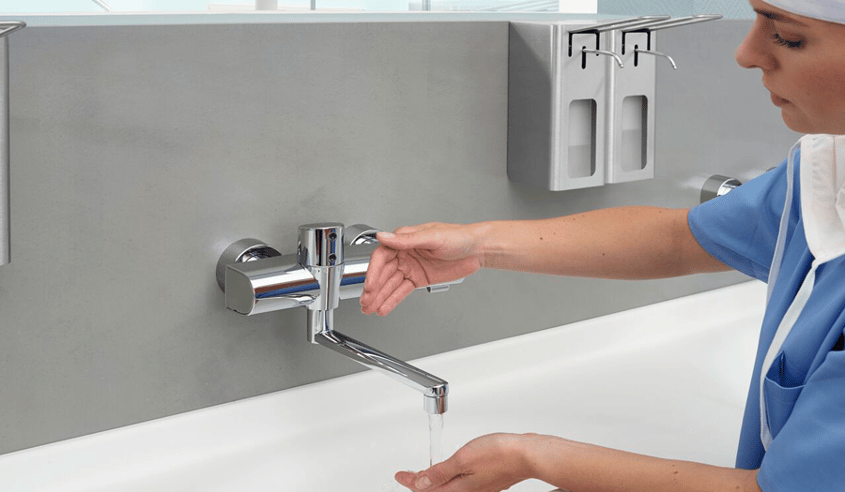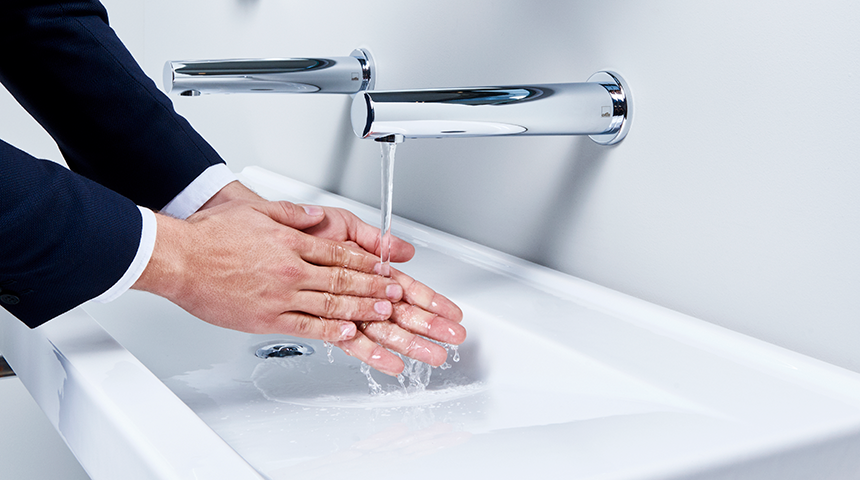Touching door handles, using your smartphone, or simply shaking hands the good old fashioned way – every day, all day, we come in contact with the most widely varied forms of bacteria, viruses and germs. And what we have actually known for a very long time is that washing our hands provides protection against infections. Dr. med. Adrian Busen tells us how to keep our hands properly clean, and why touchless faucets mean better hygiene.

As soon as the user’s hands come near the touchless faucet, water starts flowing automatically. In this situation, too, the sensor reliably identifies the position of the hands.
Why do we actually need to wash our hands regularly?
Primarily to get rid of the visible dirt, but above all not to spread everywhere we go all the germs which are not visible, and so safeguard our own health and that of other people too.
How often and when should we wash our hands?
Every time after going to the toilet, after coughing or sneezing, after being in contact with people who are ill, and, as a rule, always as the first thing we do when we get home. In other words, essentially after we have put the key away – and, incidentally, the key also ought to be cleaned every now and then.
How should I actually wash my hands properly?
The main issue here is the thoroughness. In other words, do not simply hold your hands under the tap, but soap them properly to form foam. Surface of one hand against the other, then the space between the fingers, and, in particular, not forgetting the fingertips and the area under the fingernails.

Why are touchless faucets more hygienic when it comes to washing our hands?
Bacteria collect on our hands every day, sometimes more and sometimes less. When we turn taps on and off, these bacteria get transferred onto the faucet, and that means every time the tap is touched the bacteria are transferred back again onto the hands of the user. However, since touchless faucets do not need any direct skin contact, fewer germs can get transferred. That means the fittings stay clean - and hygienic - for longer.
Which germs get transferred onto our hands as an everyday event?
Without getting too particular here, or overly specific with regard to diseases:
Coughing or wiping your nose causes germs to be conveyed out of the respiratory tract. Skin-to-skin contact also transfers a lot of surface germs.
So the best thing is not to sneeze or cough into our hands?
Exactly. If it can be avoided, not into your bare hand but into a handkerchief or into your elbow joint.

About Dr. Med. Adrian Busen
Dr. Med. Adrian Busen practices as a specialist in general medicine at the Dr. Münster
practice in Münster, in the region of Westphalia. A key focus of atte
ntion here is the issue of “Promoting Health and Prevention of Disease”. Dr. Med. Busen works in the areas of manual medicine / chirotherapy with the focus on atlas therapy (atlasReflexTh.®), as well as holding the additional distinctions of DAEM / DGEM® nutritional medical practitioner and specialist in travel medicine (CRM).
-block-desktop-860x480.jpg?width=940&name=40210_Hansa_Vantis_Style_Basin01_Hansa_Vari_oh_IR.tif(1)-block-desktop-860x480.jpg)

-block-desktop-860x480%20(1).jpg?width=940&name=Oras_Romantic_V3.jpg(1)-block-desktop-860x480%20(1).jpg)




